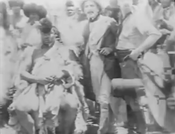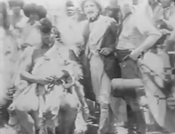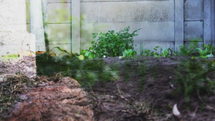
We are proud to premiere a documentary that was made as part of the Unyazi festival in 2014. Unyazi IV Electronic Music Festival (2014) took place from 9 – 13 September 2014 at venues around the city of Johannesburg. Meaning ‘Lightning’ in isiZulu, this was the fourth Unyazi festival presented by NewMusicSA. All the Unyazi festivals have included international cooperation and international artists but this was the first festival in which NewMusicSA worked specifically with another ISCM section (the Japan Society for Contemporary Music). It was also the first time that the Unyazi festival worked with the Fak’ugesi Digital Africa Festival in Johannesburg to maximize its reach and capacity. Fak’ugesi provided important funding and publicity/marketing support. Through this umbrella, Unyazi also collaborated with the A MAZE Digital Arts festival that ran concurrently. The two festivals combined for a number of workshops and performances.
https://youtu.be/wJpxtKl_DCo
https://youtu.be/wJpxtKl_DCo

"De Voortrekkers was written as a film score to an excerpt of the earliest surviving South African feature film, the 1916 De Voortrekkers. The score covers Acts 3 and 4 of the film, a 20-minute section of a 53-minute film. The original score, by Henri ten Brink, has not survived. The aim of the current rescoring is to contribute to an evaluation of orchestral film music's capacity to influence and manipulate the representation of onscreen racial identity. My doctoral thesis was a historical study of national and racial identity in South African film music, covering 1931-1969. I wrote the current work as a practical exploration of some of the issues that arose in that study, including the skewed approach to characterization that resulted from the type of music cues allocated to particular demographic groups, and the distribution of those cues to further a colonial or nationalist agenda. My aim was to determine to what extent an orchestral score could provide a more equitable balance of expressive content, reinterpreting the film's original, racially polarized narrative in a historically more neutral light, while still retaining the kinds of expressive, drama-enhancing qualities that film scores traditionally bring to the feature film medium." - Chris Jeffery
https://www.youtube.com/watch?v=j8M5vkqvfug
https://www.youtube.com/watch?v=j8M5vkqvfug

Lewensbron is a movie based on a soundscape which was in turn based on an abandoned movie project. In the course of the development of this abstract presentation, the scent of Cape Town presented itself very strongly. That, together with inspiration from Phillip Glass’ “Koyaanisqatsi”, led to the theme of water manifesting itself, with the present water crises in that city looming ever larger in our collective imagination. The soundscape itself owes some spiritual debt to Karlheinz Stockhausen’s “Cosmic Pulses” from his last cycle of works (“Klang”): It asks the audience to inhabit its world and lose themselves in its space.
Cinematography - Shuabe Jacobs
Soundscape - Douglas Scott
https://www.youtube.com/watch?v=6R6A3KAlQRg
Cinematography - Shuabe Jacobs
Soundscape - Douglas Scott
https://www.youtube.com/watch?v=6R6A3KAlQRg


